The Gate didn’t sit on the sea so much as measure it. Two uprights and a lintel—stone blacker than basalt, edges too straight for patience—threw a shadow that stayed true while clouds drifted and wind decided things. Through the aperture, night pooled even as dusk still warmed the horizon.
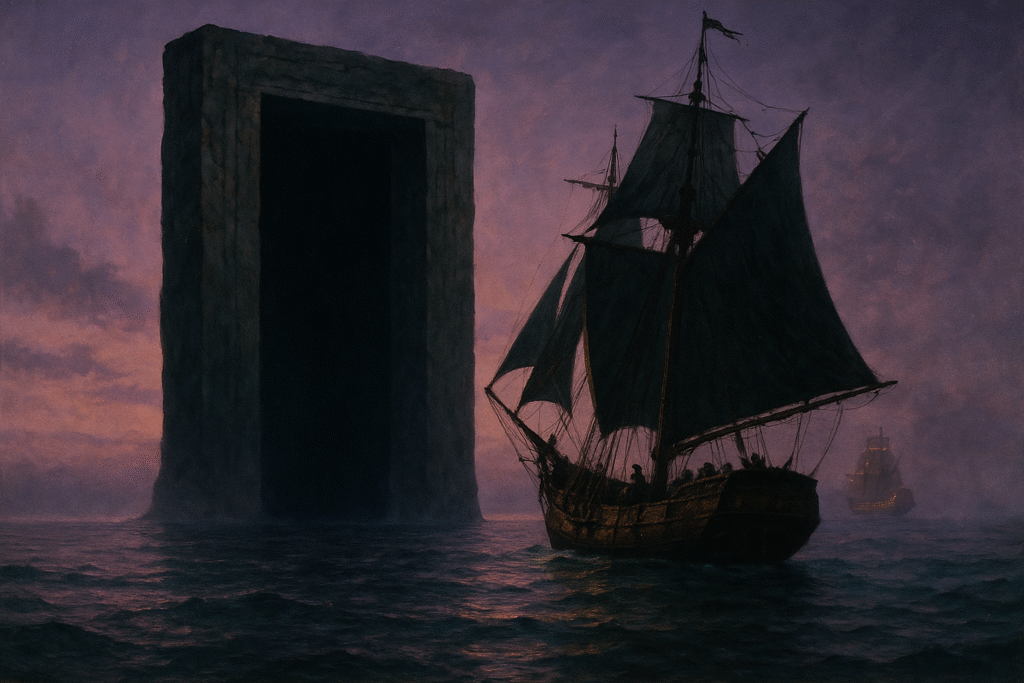
“Hold us shy,” Mireya said. “This thing counts what it sees.”
Finn lifted the Oculus. Through the lens, the Gate’s shadow wasn’t one piece but a bundle—threads of angles that tugged at everything with a keel. His palm prickled; along his life line a new knot wrote itself in faint fire: figure-eight—the stopper you tie when you can’t afford a slip.
“Gate wants us to declare a bearing and keep it,” he said. “No tacking. No lying with the helm.”
Silas’s mouth made the shape of a smile that had learned to be modest. “For one passage,” he said, “we’ll be a straight answer.”
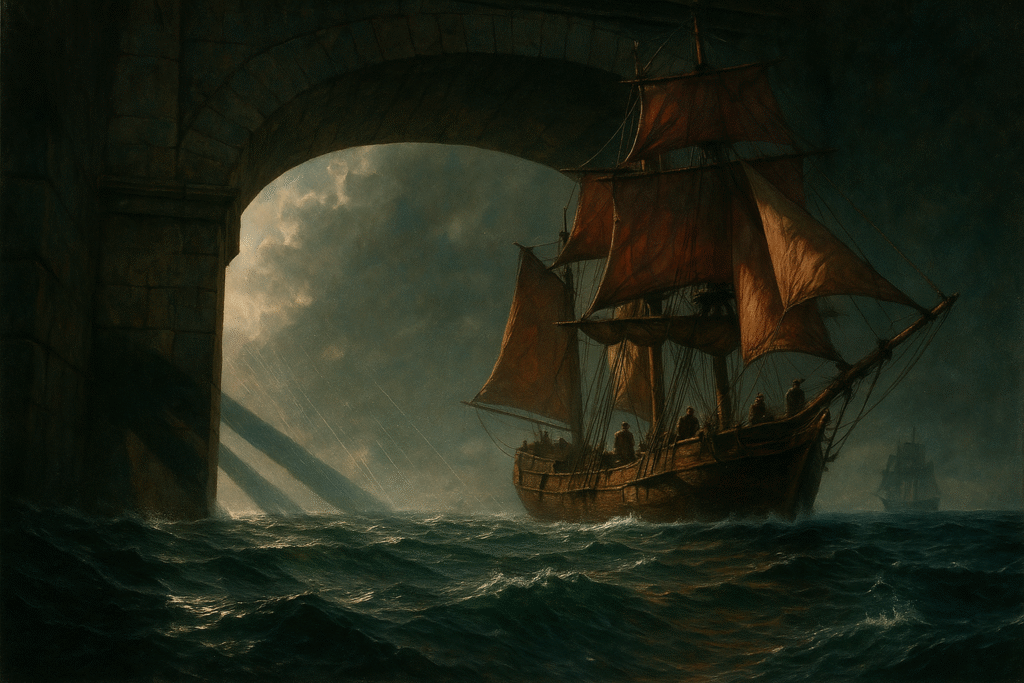
A bell rang nowhere; the sea hushed the way a room does when a judge enters it. On the Gate’s lintel, a line of faint marks stirred—ticks cut into stone by ships that had dared the aperture and declared a bearing they could keep.
Briggs spat without enthusiasm. “What’s the toll?”
Before anyone answered, the Santa Lucía’s launch began to fall from the davits. Capitana Inés Valdés stood in the bow, cloak calm. At her belt, the cracked Ash Mirror rested in its case, brass bandages bright in the afterlight.
“Two ships,” Mireya said. “One lane.”
“Then we go polite and first,” Silas said, and nodded to Hayes.
They brought the brig abeam of the Gate. The star-compass hummed; the brass Prime lay on its slot like a tooth the world had been missing. Finn set the rule over the disc; the mercury drew a single, hair-true line.
“This,” he said. “A bearing through the center. If we drift, we owe it interest.”
“Bind the intent,” Mireya said. “Make the deck believe.”
They chalked a thin stripe from the wheel to the bowsprit—a shadow-line to echo the Gate’s. Finn looped the fore stay and tied a figure-eight on a bight, palms hot with the feeling of a knot agreeing with a stone he’d never met. The line bit. The ship felt it and went still in the way a deck does when it chooses to help.
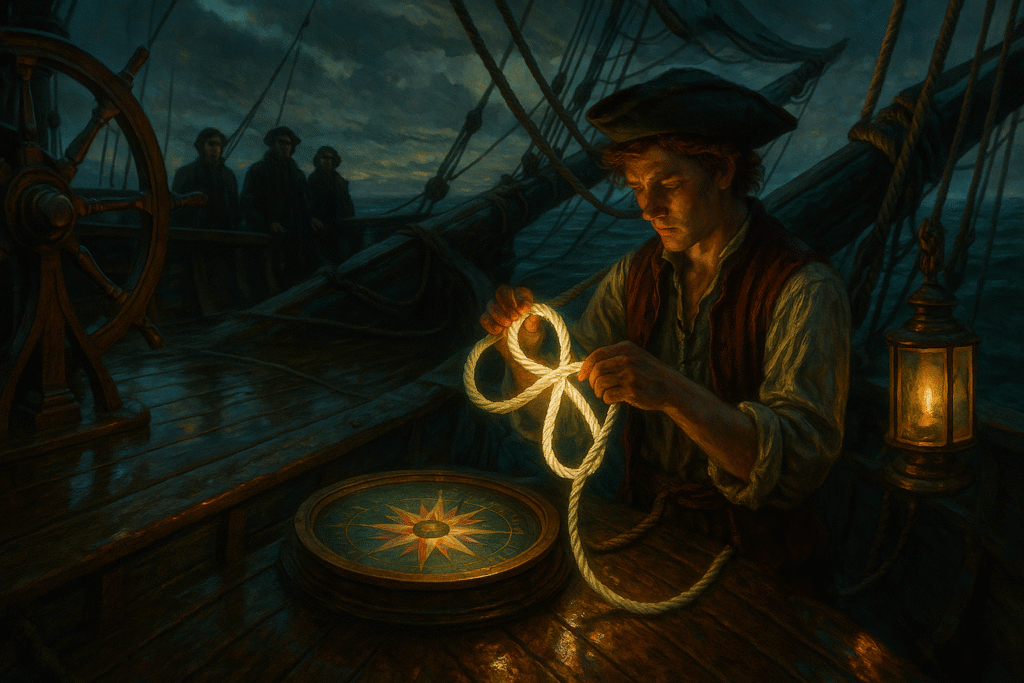
The Gate spoke without voice, meaning pressed into bone: Name your straight. Hold it. Pay with the lie you least can spare.
Silas stared into the aperture that held night like water in a frame. “I’ll pay,” he said, and the Gate accepted the intent so cleanly that his words became weight.
Mireya glanced at Finn. “We can set the angle,” she murmured, “but the toll’s his.”
Capitana Valdés hailed from respectable distance. “Blackthorne! This frame keeps old laws. I will take my turn or break my mirror on your wake.”
Silas cupped his hands to his mouth and called back, “We’ll be quick.” It sounded like courtesy. It was strategy.
“Read me,” he told Finn, softer.
Finn watched the shadow threads tighten. The Gate’s interior seemed farther away than it looked. “On my word—now.”
Hayes put the wheel to the chalk. The Crimson Horizon leaned and took the line as if it were a groove cut into the sea. The Gate welcomed them; the air went clear and thin. Every slack line turned earnest.
They entered.
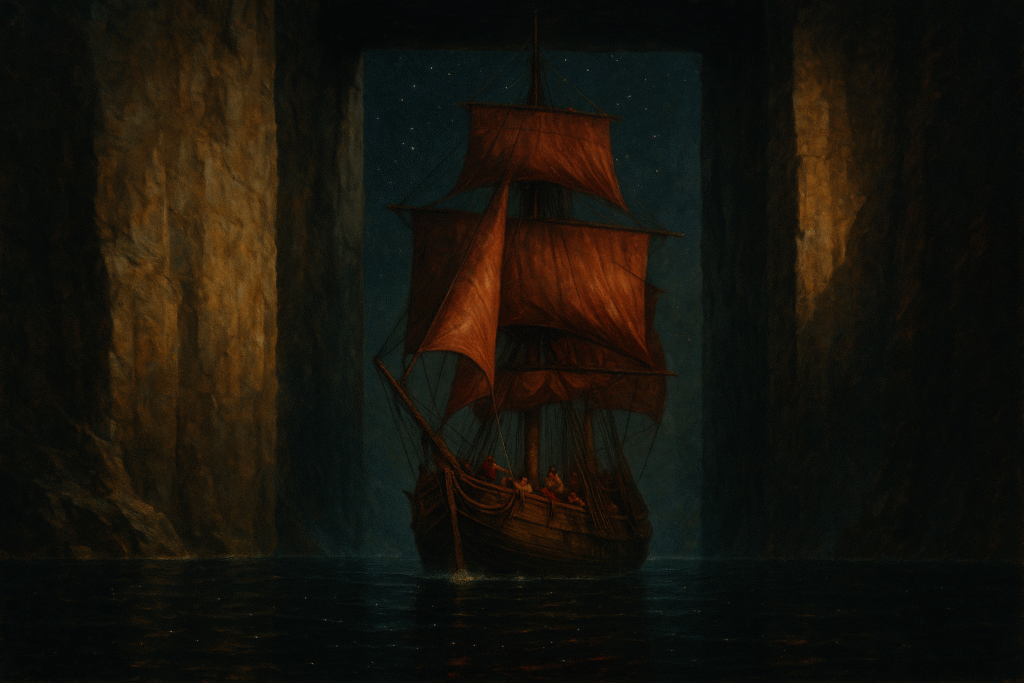
Inside the frame the world simplified. No swell. No clutter. A single wind, straight as a catechism. The star-compass quieted until its hum was a thread. Finn felt the knot in his palm hold the way a heartbeat holds: constant and slightly terrified to stop.
“Keep her true,” Mireya said. Hayes did, eyes on the chalk and something farther away than sight.
The Gate asked for its toll.
Silas’s lie was a useful one; he’d worn it like a charm: I can always turn this ship away before the cost arrives. He had believed it even when storms had disagreed. The frame took it, and Finn saw the difference in him—smaller than a flinch, larger than a habit. The captain stood straighter for losing the hope of a harmless escape.
A tremor ran along the lintel: the Santa Lucía pressed the outer shadow. Valdés didn’t wait for their wake to finish; she trimmed her sails to slide into the same straight with sovereign arrogance and a broken tool that loved her for it.
The mirror flashed. Light pinched.
The Gate’s wind tried to swerve a degree. The chalk line on their deck stayed true. The figure-eight burned in Finn’s skin and held.
“Anchor the shadow,” Mireya said instantly.
Briggs threw a canvas over the foredeck—doused in lampblack, edges weighted—so their shadow on the water sharpened. The Gate’s counting liked that; it stopped trying to be helpful, which in places like this is the best favor you get.
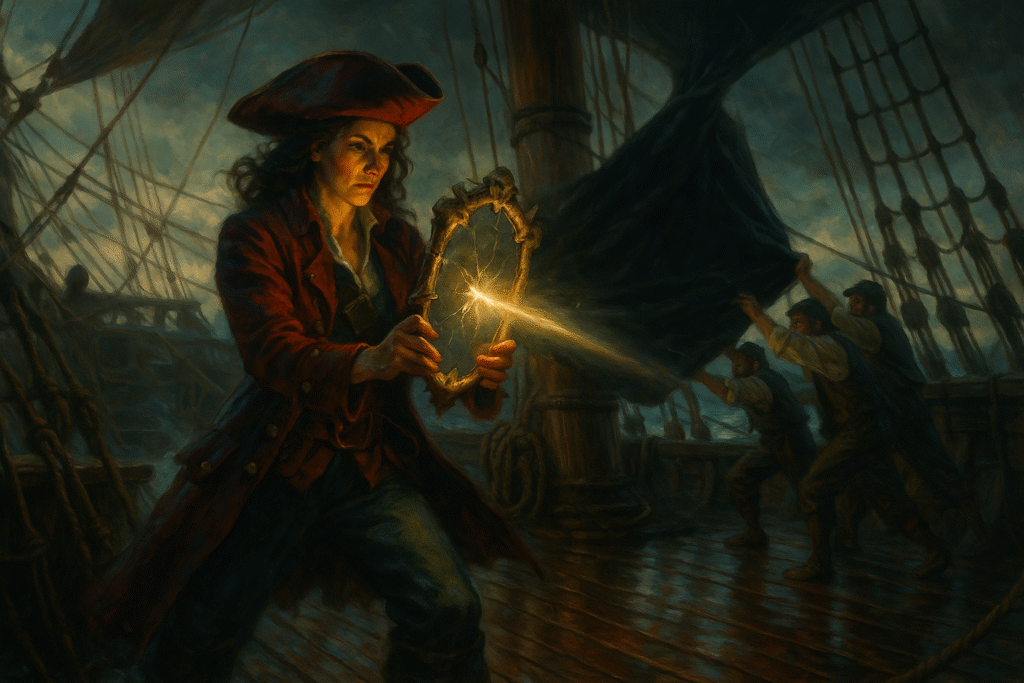
Midway through the aperture the night changed key. Finn saw it in the Oculus: a faint scarp in the dark—an inner frame—offset by a finger’s breadth.
“Step half-left on my count,” he said, and heard his own calm as if from someone braver.
“On your word,” Hayes said.
“One… two… now.” The helm moved less than a thought, and the brig’s keel passed the second plane as if stepping across a crack in a parlor floor. Behind them, the Santa Lucía took it on the wrong side; her rig shuddered; her figurehead looked a little to the left instead of the right for the space of a breath.
The Gate liked precision. It rewarded them with the simplest thing a sea can give: just enough. The aperture widened by a hand. The chalk line brightened. Finn’s knot cooled from fear to function.
Then the frame found a new price.
The Gate’s interior filled with stars that didn’t belong to this season. The Crimson Horizon sailed under constellations that mapped regret. Finn felt Silas see one night—the one he’d bargained once and balanced later—set cleanly on a shelf behind his heart where a man can carry it without thinking it’s a weapon. Briggs’s big hands softened on the rail. Mireya’s mouth loosened and went fiercer for it.
“Almost,” Finn said. “One more breath.”
The far edge of the Gate stepped toward them, slow as a verdict and twice as inevitable.
They left the frame.
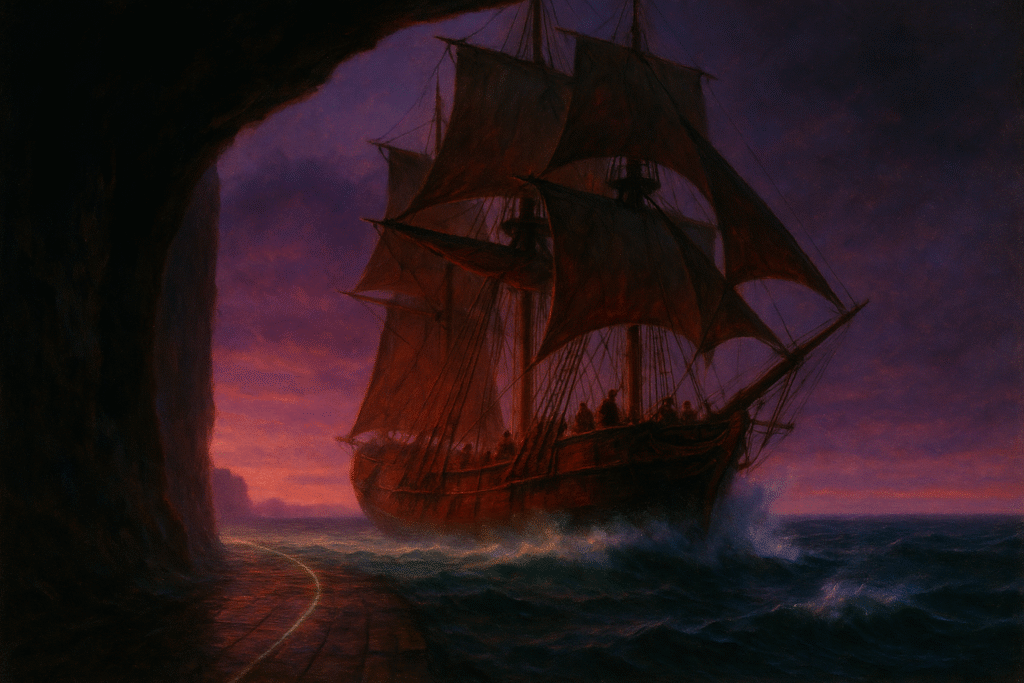
Wind returned to being at least partially opinion. Swell remembered how to exist. The brig’s wake widened like a laugh after a long vow. On the other side of the Gate, the Santa Lucía’s bowsprit cleared the shadow with less grace and all the poise; Valdés stood with her hands light on the case of the mirror, eyes sharp enough to shave wood.
Between them and the Gate a pendant floated up from the black water—no chain, no hand, just a token granted by a machine that liked neat answers. It was a hemispheric coin—two faces of etched brass hinged by a sliver of night, one side reading THEN, the other NOW.
Finn fished it aboard on the boathook. The coin was cold as truth. When he held THEN up, stars on the horizon joined into routes. When he flipped NOW, currents revealed their habits. The star-compass hummed approval like a cat in a lap it had chosen.
“Prize aboard,” Mireya said, as if reading a ledger line she intended to balance.
“Course?” Silas asked, voice clearer for the lie he had lost.
Finn raised the Oculus. The coin’s THEN and NOW overlaid till they made a third word between them: a place not yet named on any chart they owned.
“The Antemeridian Rift,” he said, and felt the ship listen.
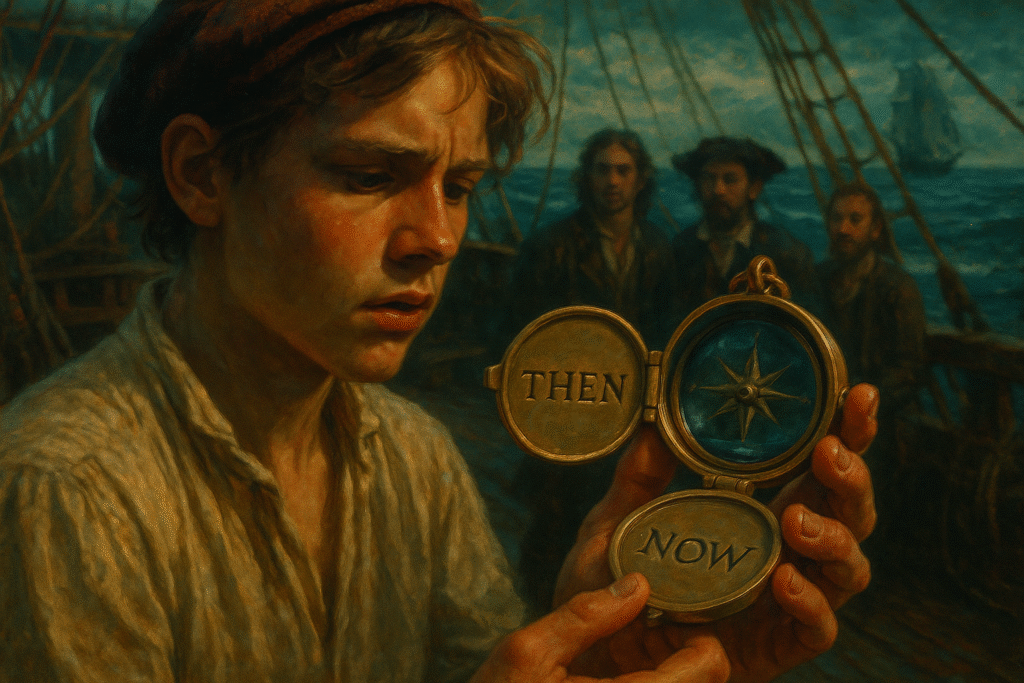
Valdés brought her launch off the quarter and hailed without theater. “You paid what it asked,” she called. “One day I’ll pay more.”
Silas tipped his hat an inch that said both respect and refusal. “Then we’ll learn new math.”
She laughed once, short and bright, and fell back to her ship.
Night settled cleanly. The Gate shrank behind them to a rectangle of velvet pinned to the sea. Finn tucked the coin in the chest, where the serpent lock turned its head and blinked, unimpressed and entirely awake.
Ahead, the eastern stars narrowed into a seam—a fault line of faint light that ran pole to pole like a stitch in the world.
Briggs leaned his shoulder into the rail and grinned at something only he could love. “Tomorrow, then.”
“Tomorrow,” Mireya said.
“Tomorrow,” Silas agreed, and set the wheel to a bearing that wouldn’t lie for anyone.
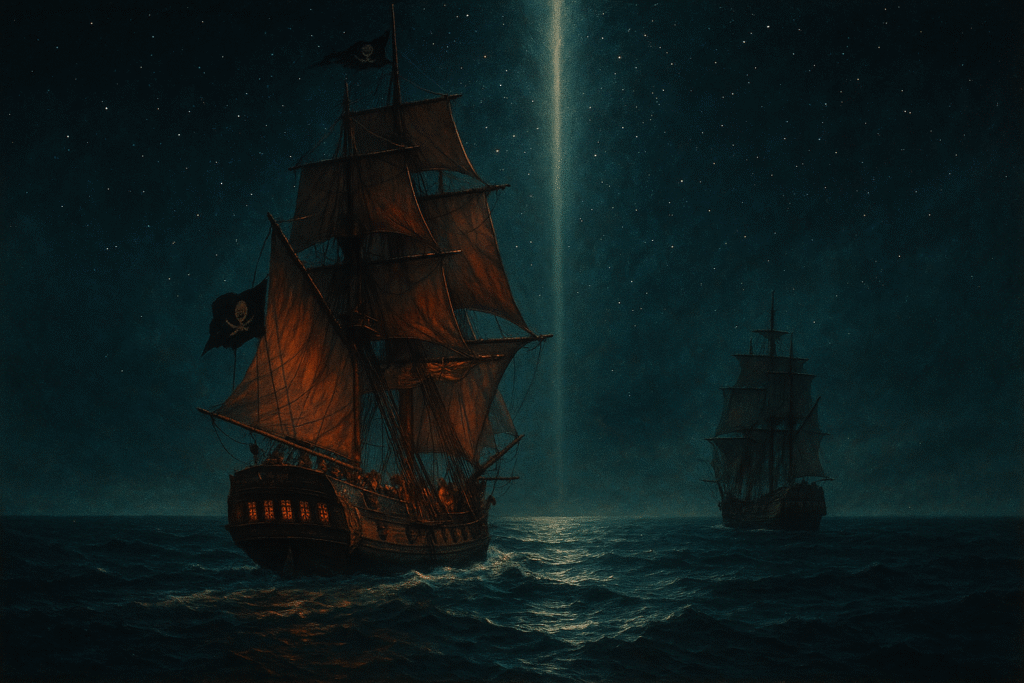
—To be continued—
